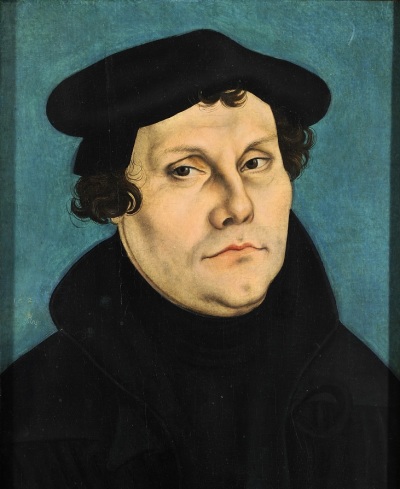Can We Stop Complaining About Reformation Celebrations Already?

Though the precise date marking the 500th anniversary of the Protestant Reformation has now passed, commemorations and celebrations will continue through the year's end. Likely, therefore, so will articles explaining why the Reformation ought not to be celebrated. As Ross Douthat observes, even "in official ecclesiastical circles the rule is to speak of the Reformation in regretful tones." (Unless, strangely enough, that ecclesiastical circle encompasses the Vatican, which marks the occasion with a commemorative Martin Luther stamp.) The most common explanation for lament is, of course, that the Reformation divided the Christian church. Catholic historian Richard Rex concisely summarizes: "In 1500, western Christendom was a seamless robe. By 1600 it was a patchwork quilt."
A simplistic (but not inaccurate) response to this simplistic (but not inaccurate) assertion will observe the heavy lifting that word "western" is doing. That is, any talk of a "seamless robe" has to ignore the enduring division of Christendom already inaugurated 500 years earlier, when the Western Catholic and Eastern Orthodox churches mutually excommunicated one another.
But, one might reasonably counter, neither Catholics nor Orthodox celebrate the schism of 1054. And there is even less reason to celebrate the Reformation because, unlike that earlier East-West schism, it precipitated a century of warfare. True, but as Adam Serwer recently observed in a different context:
"Many Americans died in the Revolutionary War; neither the United States nor Great Britain today regards its outcome as lamentable. Few regret that George Washington and King George III didn't sit down at a table and hash out a compromise. Almost no one wrings their hands today about the uncivil tone of the Boston Tea Party, or the colonists' stubborn insistence on self-governance."
Not only does neither party involved in America's War for Independence regard its outcome as lamentable; one party actually celebrates that outcome every July 4th. It is perfectly understandable that the British don't join in the celebration. But we can admire them for resisting the urge to scold Americans for rending the seamless robe of the British Empire—despite the fact that, unlike the Protestant reformers, it was the express intent of the American colonists to effect division.
Both Protestants and Catholics articulating the "Reformation-as-tragedy" thesis sometimes pause to acknowledge that Luther's intention was never to divide the church. But Catholics especially might be expected to pause a little longer over this fact, since "intention" plays such a prominent role in Catholic moral theology. No less than the celebrated Thomas Aquinas is credited with first articulating the important "principle of double effect." "Nothing hinders one act from having two effects," he wrote, "only one of which is intended, while the other is beside the intention."
The implication is that one might licitly act with the intent of effecting some good, even while recognizing that an unintended bad effect might also result. If your heart stops, I might do chest compressions with the intent of getting it beating again, even though I foresee the possibility of ribs being bruised or even broken in the process. Unless you've got a death wish, though, it would be churlish to complain about sore ribs instead of celebrating your life having been saved.
No reputable historian or theologian believes Luther intended the negative side-effect of dividing the church. Indeed, they will explain that Luther himself refused to believe that the church had been divided. Professing the same creed as all Christians, he confessed the church to be one by its very nature, even if not visibly so. (Just as he confessed with the creed that the church is holy by its very nature, despite much visible evidence to the contrary.)
He simply rejected the facile equation of the true church with a particular visible institution. Instead, he famously explained, "a child seven years old knows what the Church is, namely, the holy believers and lambs who hear the voice of their Shepherd." Or, as his theological heir C.F.W. Walther put it, "The true Church, in the most real and most perfect sense, is the totality of all true believers."
Richard Rex asserts that "Luther invented the concept of the 'invisible church.'" Strictly speaking, that's false for a number of reasons. But even if it were true, it ignores the fact that this very concept was implicitly but necessarily embraced by Catholicism at the Second Vatican Council. From antiquity it was claimed that "there is no salvation outside the church," and for more than a millennium "the church" was popularly understood as the visible institution of which the pope was the head. With Vatican II, however, it was asserted that even those who "do not know the gospel of Christ or his Church" can "attain to salvation." If salvation is impossible outside the church, and yet is possible for those outside of communion with the visible institution under the papacy, it necessarily follows that the church, in its essence, is other than this visible institution.
Yes, the (institutional) unity of the (western) church was (unintentionally) undone in the 16th century. Yes, even this might be deemed tragic. And, yes, especially tragic were the wars following on that division. But simply tossing "Luther," "division" and "wars" into the same sentence, as many do, and hoping readers draw the conclusion that Luther caused the division, which caused the wars, is grossly misleading.
When Peter Leithart recently asked, "How did a Reformation committed to the gospel, catholicity, and unity shatter the Western church and dismantle medieval Christendom?" he answered bluntly: "The Roman Catholic Church was one of the main culprits." His reasoning is that "Luther was excommunicated ... without receiving a serious, much less a sympathetic, hearing." So he asks the even more pointed questions: "What if the Catholic Church had recognized Luther, as many Catholics do today, as a 'witness to the gospel'? What if the Catholic hierarchy had listened?"
Those are counterfactual questions, and so cannot be answered with any degree of certainty. But it is possible to answer the question of why the hierarchy did not listen, or even seriously engage Luther's ideas with their own ideas. As Catholic historian and Reformation critic Brad Gregory explains, "they didn't really want to respond in kind, defending the Church and its teachings and practices in print, lest they give the impression that Christian doctrine was somehow in doubt or there was actually something questionable to debate."
But Gregory acknowledges yet another reason for not engaging Protestants with mere words: "there was no reason for Catholic Church authorities to think, in the 1520s, that the Protestant Reformation would be any different from medieval heretical movements that had arisen in preceding centuries and been suppressed...Albigensians in southern France, Waldensians in the Alps, Lollards in England, and Hussites in Bohemia."
Wait, what? That allegedly seamless robe had in fact been rent multiple times in the centuries immediately prior to the Reformation? But force of arms sufficed to patch it (seamlessly?) back together again? The Catholic church didn't think it necessary to engage in intellectual debate with Protestants, because it assumed they could also be silenced by fire and sword? It sounds a bit like lamenting this division of the church is actually lamenting the fact that, in this instance, violence didn't work.
But it certainly didn't fail for lack of trying. Within months of Luther's death, pope and emperor entered into an agreement to begin the forcible suppression of Lutheranism, leading to the Schmalkaldic War in Germany. Two decades later, the first in a long series of French conflicts was touched off by the massacre of Protestants worshipping at Wassy. The most well-known episode of the subsequent French wars is the St. Bartholomew's Day Massacre, again of Protestants. When news of it reached Pope Gregory XIII, he—what's the word?—celebrated by having a commemorative medal struck and frescoes of the massacre commissioned for Vatican walls. Later, the Thirty Years' War was responsible for nearly eight million casualties, was sparked by the emperor again trying forcibly to impose Catholic uniformity in his territories.
Some modern scholars object to calling these conflicts "Wars of Religion," because religion in the 16th century simply could not be disentangled from other spheres of life, such as politics and economics. Because the wars were never only about religion, Brad Gregory himself cleverly refers to them as "the wars of more-than-religion." But if one wants to be clever, one might simply call them the Wars of Roman Aggression.
This is the light in which one must understand Gregory's ambiguous acknowledgement that "the only forms of Protestantism that survived...were those that received sustained support from political authorities." Well, yes, if Catholic authorities consistently attempted to eradicate Protestants, it's hardly surprising that their movement would only survive if more sympathetic authorities protected them from violence. Which is why Richard Rex is to be admired for his more honestly direct statement of the case: "Nowhere did Protestantism, once introduced, disappear except as a result of strenuous persecution."
If one has a basic grasp of these facts—as even critical Catholic scholars like Richard Rex and Brad Gregory certainly do—it should not be difficult to understand why Protestants continue to celebrate the Reformation. The intention and primary effect (whatever other secondary effects resulted) of the reformers was to restore to primacy what they understood to be the biblical gospel. To the extent that this gospel continues to be cherished by Protestants, they will of course want to celebrate that restoration. No less will they want to celebrate the fact that its profession was preserved despite every attempt to suppress it with violence.
Even those Catholics who, with the Vatican, recognize Luther as a "witness to the gospel," and who, with Aquinas, recognize the double-effect distinction, might therefore hesitate to decry such celebrations. And those who recognize, again with the Vatican, that war and bloodshed is not a price worth paying for institutional unity might even celebrate the Reformation for bringing home the futility of believing and acting otherwise.
Korey Maas is assistant professor of history at Hillsdale College.



























